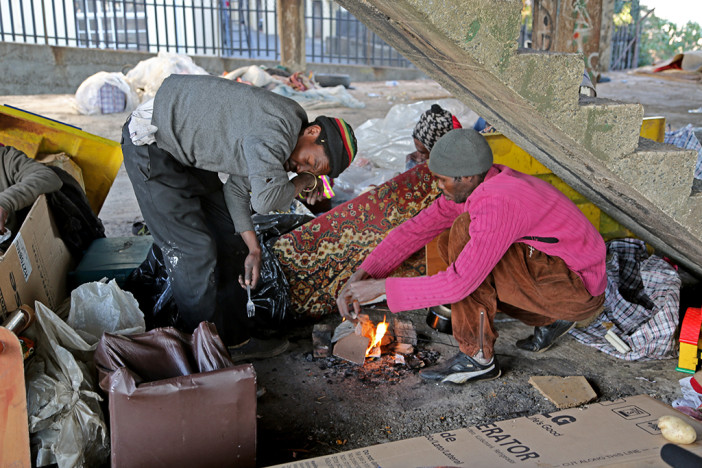Sandra Opperman sleeps under a surprisingly clean threadbare blue blanket on a pavement in the Cape Town CBD.
“Sjoe, meisie, maar dis koud op die straat [girl, it’s cold on the street],” she admits after begging for a R5 “for bread”.
“But this is the life I chose. It’s where I live and it’s where I will die.”
She is one of 7 000 people the City of Cape Town counted in a research project to determine the number of people sleeping on the street to try and understand the homeless situation.
The project will assist in determining how to distribute future resources to help as many people as possible, city officials said in a statement on Thursday.
In the last year, the council assisted 613 street people to get off of the streets, officials confirmed.
Of these, 58 were reunited with their families, and 555 were assisted with access to social, health and rehabilitation services.
Aunty Sandra, as she asked to be called, was not one of them.
“I am sick and tired of these people trying to send me back to Beaufort [West],” she insisted.
“I want to live here. I ran away from a hard life where I was beaten every night. I have nothing, not even an ID. But I am surviving. Nothing will convince me to go back to where I come from.”
She has two grown children – who live with a relative – to whom she had not spoken in 12 years.
“Nobody wants a drunk for a mother. They don’t want anything to do with me. But it’s okay. I have a new family here in the city and we look out for each other.”
Getting back on their feet
Fieldworkers engaged with street people daily to assess their needs and facilitate assistance for those who wanted help.
The city’s reintegration unit was tasked with reuniting street people with their families; helping them get back on their feet and undertaking regular checks on their progress, city officials say.
Almost R10m had been invested into the municipality’s street people programme this financial year. The budget had grown from R4.5m in 2013/14 to R7.8m in 2014/15 to R9.7m in 2015/16 – effectively doubling in three years.
According to the city, fieldworkers last year conducted interviews with 2 670 street people older than 18 years to determine the reasons for migrating to the street and how they survived.
Those interviews found women were more likely to use shelters and men were more regularly found on the street.
Half of those surveyed were between 18 and 35, with more than 65% born in Cape Town.
During the second phase last month, fieldworkers conducted a headcount of people living on the street by walking through the areas between 04:30 and 11:00 over a 10-day period. They found 4 862 were homeless, of which 79% were men.
Nearly three-quarters were aged between 26 and 45 years.
Another 2 521 slept in shelters, bringing the total number of displaced people surveyed to 7 383, the city said.
Mayoral committee member for social development Suzette Little said the council’s priority was helping those who wanted to get off of the streets. The second was preventative in stopping others from migrating to the streets, and the third to sensitise the public through the Give Responsibly campaign.
Not ready to change
Opperman said her “family” on the street had been living rough for over a decade.
“This is our lives. This is what we know. I don’t know how I will act if I should have to live by someone else’s rules.
“Right now, I get to do what I want. I come and go as I please. Nobody tells me I am an embarrassment or I must pull myself together.
“People look down on people like me, but we all have our own problems. Alcohol is my problem and solution. And right now I am not ready to change.”
Apart from the street people programme budget, the city has set aside another R2m to create job opportunities for street people through the Expanded Public Works Programme (EPWP), Little said.
“The EPWP component of our street people programme is crucial, because it gives individuals the opportunity to rebuild their confidence and restore their dignity through a hand-up instead of a hand-out.
“One of our clients used his job opportunity to save up and pay for an acupuncture course. He has found new purpose in life and is off the street, because he made the most of his opportunity.”
Little said the city could not force people to accept assistance, pointing out there were those who “prefer to remain on the streets because it saves them from taking responsibility for their lives”. News24






 WhatsApp us
WhatsApp us 

